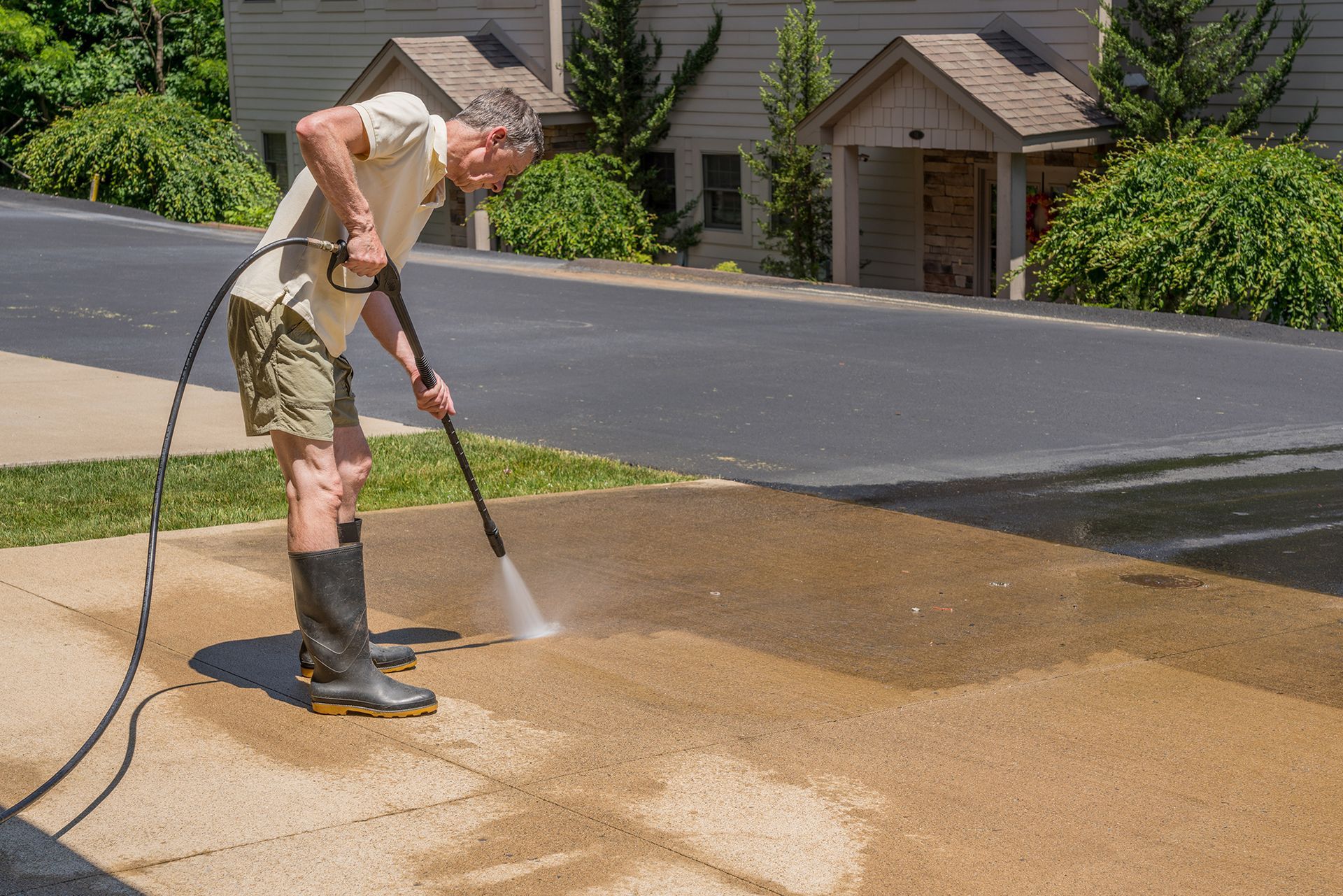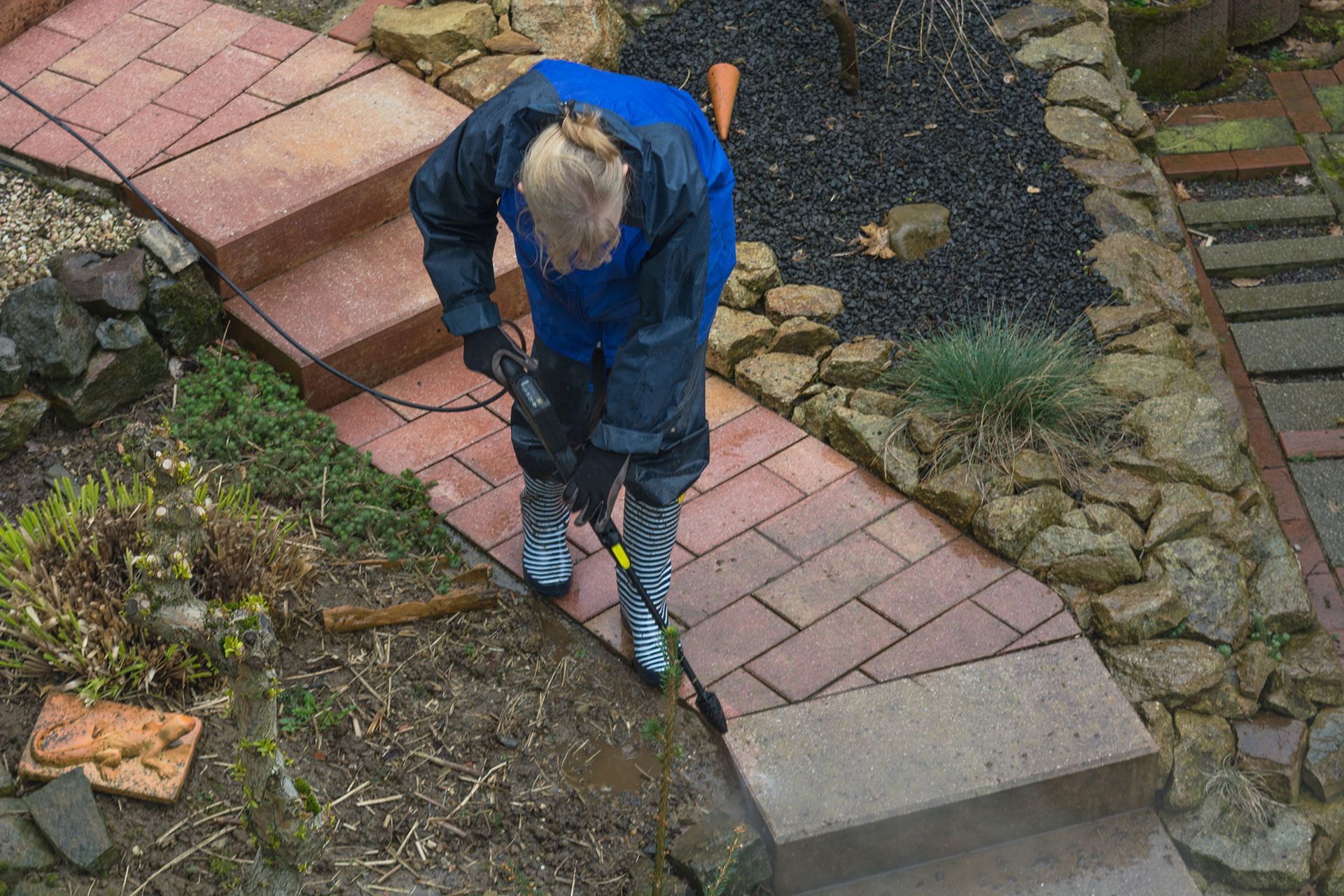Transform Your Property: The Top 10 Places for Pressure Washing Magic
What Places Need Pressure Washing the Most?

Pressure washing is a bit like magic for your exterior surfaces. With a powerful burst of water, it can transform grimy, weather-worn areas into sparkling clean spaces. But have you ever wondered which places need pressure washing the most? Whether you're a homeowner or a business owner, understanding where pressure washing can make the most significant impact is key to maintaining the beauty and longevity of your property.
Understanding Pressure Washing
What is Pressure Washing?
Before diving into the list of places that benefit from pressure washing, let's break down the basics. Pressure washing is the use of high-pressure water to remove dirt, grime, mold, mildew, and other contaminants from various surfaces. It's like giving your property a refreshing shower.
How Does Pressure Washing Work?
Imagine a forceful stream of water that's 50 times more powerful than your garden hose. This concentrated stream, combined with specialized nozzles and cleaning solutions, works to blast away even the toughest stains and buildup. It's effective, efficient, and eco-friendly.
Why is Pressure Washing Important?
Exterior Surfaces at Risk
Over time, your property's exterior surfaces face a relentless assault from Mother Nature. Rain, wind, sun, and pollution can leave them looking tired and dirty. Pressure washing rejuvenates these surfaces, making them look almost as good as new.
Health and Safety Concerns
Dirt, mold, and algae aren't just unsightly; they can be hazardous to your health. Slippery walkways, for instance, can lead to accidents. Pressure washing removes these dangers, ensuring a safer environment for all.
Top 10 Places that Need Pressure Washing
Now, let's get to the heart of the matter. Where should you aim that high-pressure stream? Here are the top places that need pressure washing:
1. Residential Properties
Your home's exterior takes a beating from the elements. Siding, brick, and even windows can accumulate dirt and grime. Pressure washing can restore your home's curb appeal.
2. Commercial Buildings
First impressions matter for businesses. A clean storefront or office building can attract more customers and clients. Don't let dirt and stains deter potential business.
3. Driveways and Walkways
Oil stains, tire marks, and algae growth can make your driveway and walkways look neglected. Pressure washing can give these areas a clean and welcoming look.
4. Decks and Patios
Outdoor living spaces should be inviting. Pressure washing can remove slippery algae and deep-seated stains from wood and concrete surfaces.
5. Parking Lots
Parking lots endure a constant stream of vehicles and foot traffic. Regular pressure washing can extend the life of the pavement and create a safer environment.
6. Sidewalks and Public Spaces
Clean sidewalks and public spaces contribute to a sense of community pride. Pressure washing can remove graffiti, gum, and other unsightly marks.
7. Roofs and Gutters
Moss and algae on your roof can lead to expensive repairs if left unchecked. Pressure washing can prolong the life of your roof and maintain gutter functionality.
8. Fences and Walls
Wooden fences and retaining walls can deteriorate if not cleaned regularly. Pressure washing can remove discoloration and grime, preserving their integrity.
9. Pool Areas
Pool sides can become dangerously slippery when algae and grime accumulate. Pressure washing can make these areas safe and attractive.
10. Industrial Facilities
Large-scale industrial facilities often have vast areas that need cleaning. Pressure washing is an efficient solution for maintaining cleanliness and safety.
Benefits of Regular Pressure Washing
The benefits of pressure washing go beyond aesthetics. Here's why regular pressure washing is a smart choice:
Aesthetics and Curb Appeal
A clean property looks more appealing, whether you're a homeowner or a business owner. It's like putting on a fresh coat of paint without the hassle.
Preventing Costly Repairs
Regular pressure washing can prevent long-term damage to surfaces, saving you money on repairs and replacements down the road.
Enhancing Property Value
If you're looking to sell your home or commercial property, a clean exterior can significantly boost its value. It's a small investment with a potentially huge return.
DIY vs. Professional Pressure Washing
Should you DIY your pressure washing or hire professionals? Let's weigh the pros and cons:
Pros of DIY Pressure Washing
- Cost savings
- Flexibility in scheduling
Cons of DIY Pressure Washing
- Risk of injury or damage
- Limited access to professional-grade equipment
Pressure Washing Safety Precautions and Tips
If you decide to tackle pressure washing yourself, here are some essential safety precautions and tips:
Protective Gear
Wear appropriate protective gear, including safety goggles, gloves, and non-slip footwear, to prevent accidents and injuries.
Environmental Considerations
Use eco-friendly cleaning solutions and be mindful of water usage to minimize your impact on the environment.
Equipment Maintenance
Regularly maintain your pressure washer to ensure it operates safely and efficiently. Check hoses, nozzles, and connections for wear and tear.
Conclusion
Pressure washing is a versatile and effective method for cleaning a wide range of surfaces, from residential properties to industrial facilities. Knowing where pressure washing is most needed and understanding its benefits can help you maintain a cleaner, safer, and more attractive environment. Whether you choose to DIY or hire professionals, regular pressure washing is an investment that pays off in the long run.
Pressure Washing FAQs
Q1: What is the best time of year for pressure washing?
A1: Spring and fall are generally the best times for pressure washing. Mild weather ensures that surfaces are neither too hot nor too cold, allowing for optimal cleaning results.
Q2: Can pressure washing damage surfaces?
A2: Improper use of high pressure can damage surfaces like wood and delicate siding. It's crucial to adjust the pressure and choose the right nozzles for each surface type.
Q3: Is pressure washing safe for the environment?
A3: Pressure washing can be environmentally friendly if eco-friendly cleaning solutions are used, and water runoff is properly managed to prevent contamination.
Q4: How often should I pressure wash my property?
A4: The frequency of pressure washing depends on factors like climate and traffic. Generally, an annual or biannual cleaning is sufficient for most properties.
Q5: What is the cost of professional pressure washing services?
A5: The cost varies depending on the size and scope of the project. On average, you can expect to pay between $100 and $300 for a standard residential pressure washing job. Commercial and industrial projects may cost more.
Q6: Are there any surfaces that should not be pressure washed?
A6: Yes, certain delicate surfaces like painted surfaces, asphalt shingles, and some types of siding can be damaged by high-pressure washing. It's essential to know the limitations and use the appropriate cleaning methods for such surfaces.
Q7: Can pressure washing remove graffiti effectively?
A7: Yes, pressure washing can effectively remove graffiti from many surfaces. However, it may require specialized equipment and cleaning solutions. In some cases, professional graffiti removal services might be necessary.
Q8: How do I prepare my property before professional pressure washing?
A8: Before professional pressure washing, clear the area of any obstacles, fragile items, or vehicles. Ensure all windows and doors are tightly sealed to prevent water from entering your property.
Q9: Will pressure washing damage my plants and landscaping?
A9: High-pressure water can harm delicate plants and landscaping. It's advisable to cover plants and shrubs with plastic or wet them thoroughly before pressure washing. Afterward, rinse them with clean water to dilute any cleaning solutions.
Q10: Can pressure washing remove oil stains from concrete driveways effectively?
A10: Pressure washing is an excellent method for removing oil stains from concrete driveways, but its effectiveness depends on the age and severity of the stain. For deep or stubborn oil stains, professional cleaning and specialized detergents may be required for optimal results.
Looking for a Free Pressure Washing Estimate? No worries! DC Pressure Washing Pros serves Washington, DC and the surrounding Metro Area with top-notch pressure washing services.
Our team utilizes state-of-the-art pressure washers, ensuring a deeper and more effective clean compared to standard household equipment. Get in touch with us today to request an estimate for pressure washing services in the Washington, DC area.
Pressure Washing Services in Washington, D.C.: Expert Tips and Insights

CONTACT
DC Pressure Washing Pros
202-804-9044

